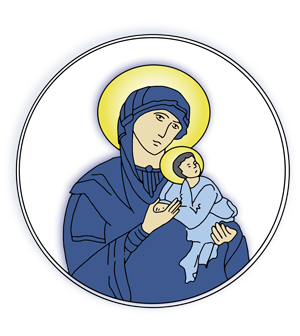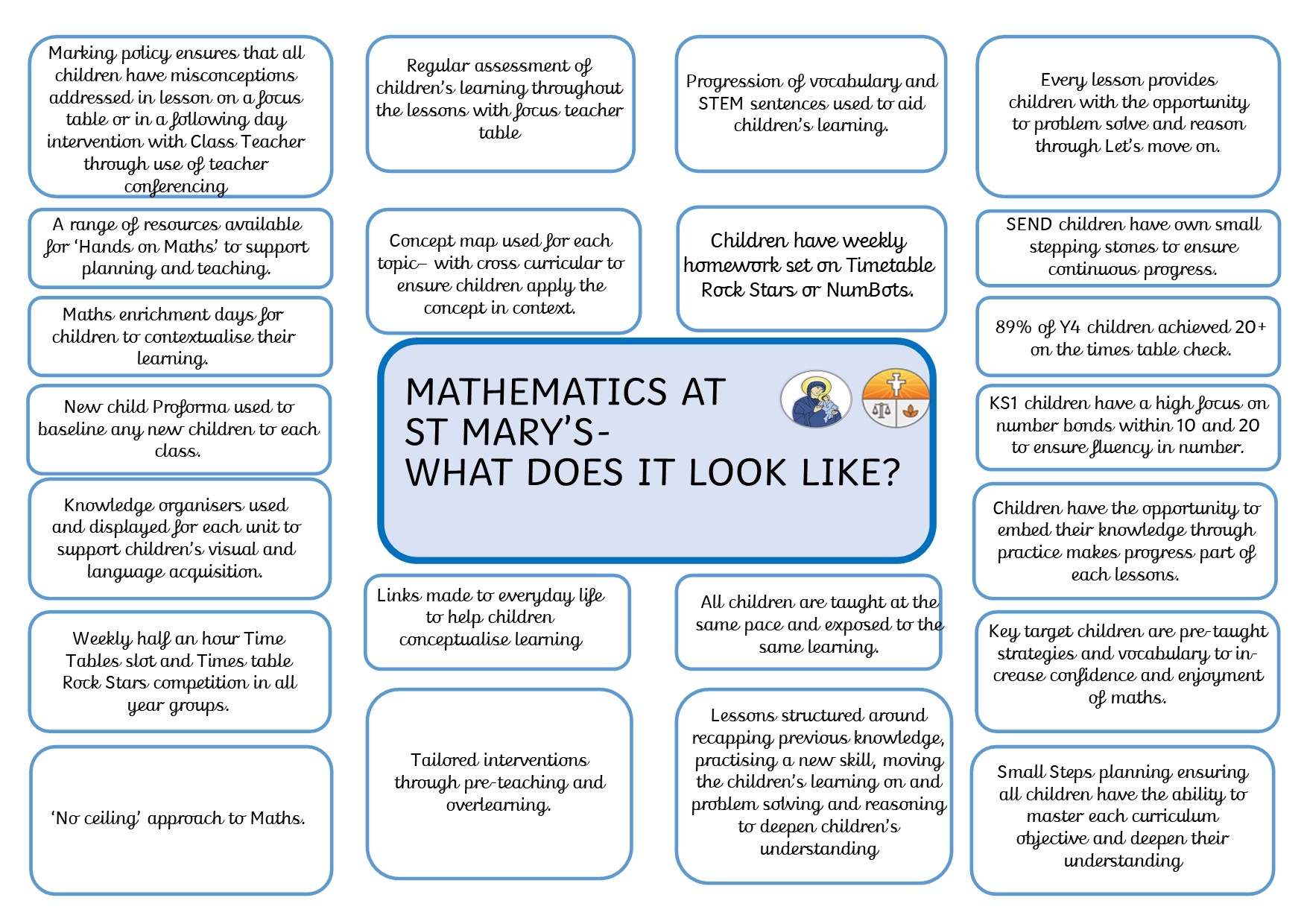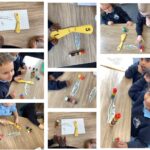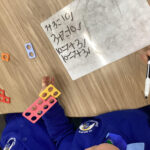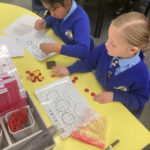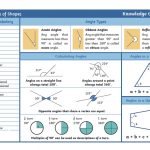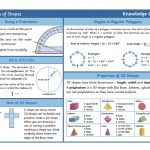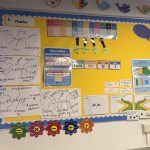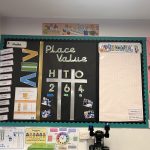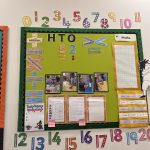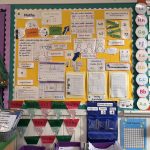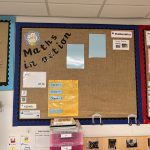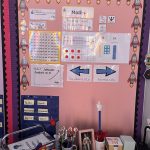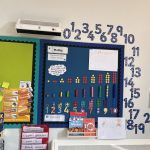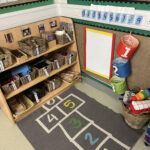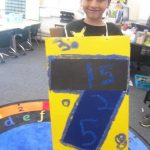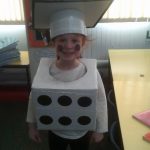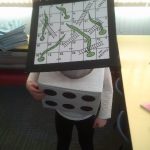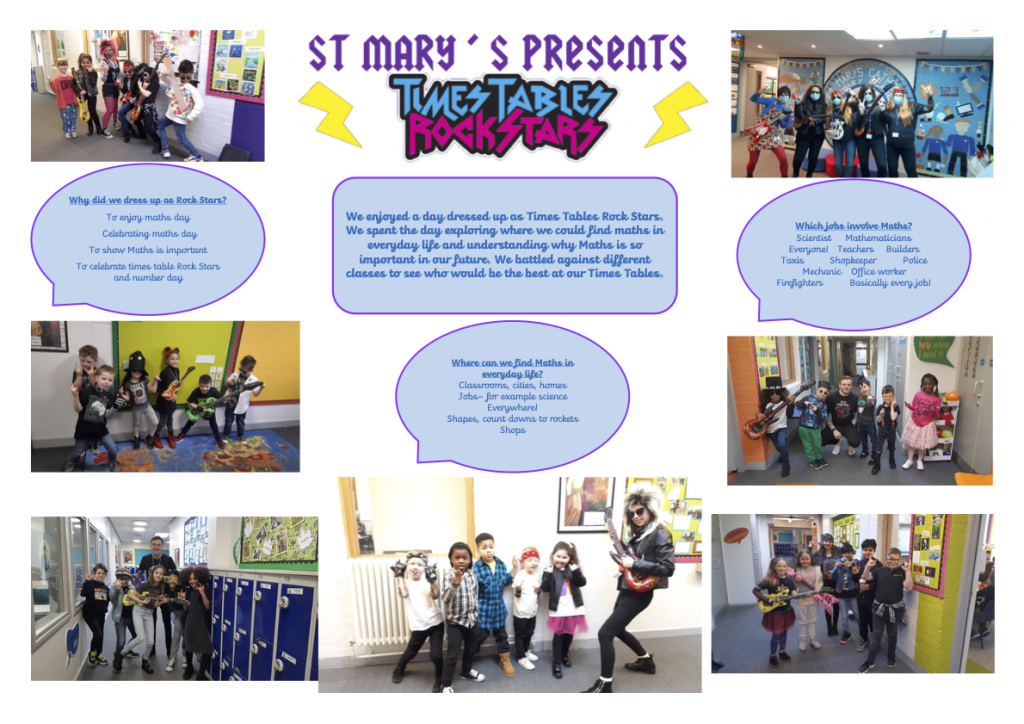Our approach to Mathematics
At St Mary’s, Mathematics is taught for one hour every day. We have uncompromising aspirations for our children with a ‘no ceiling’ approach to our teaching. This allows all children to experience success and allow them to know more, remember more and make connections within their learning. The Maths curriculum is designed to be broad and balanced and to foster a love of learning, allowing them to move on to secondary school with a secure understanding of the foundations.
To support our children through their exploration of primary maths, we follow the Concrete, Pictorial, Abstract approach (CPA). This approach allows children to make connections with real world objects (manipulatives) before moving on to pictures, and eventually on to abstract. Please see below for further information:
Concrete
Children benefit greatly from access to concrete resources, such as blocks, counters and visual aids. These hands-on tools help them grasp abstract concepts in maths more effectively. By engaging their senses, these resources foster deeper understanding, critical thinking and creativity. They also make learning more interactive and enjoyable – promoting active participation and confidence in young learners.
Pictorial
Children will then be provided with pictorial resources like charts, diagrams, and illustrations. These visual tools bridge the gap between concrete experiences and abstract ideas, aiding comprehension and retention. Pictorial aids make lessons more engaging and accessible, helping children visualise concepts and apply them in meaningful ways. They also support diverse learning styles, enhancing understanding across subjects.
Abstract
Abstract learning encourages children to think critically and apply knowledge beyond concrete examples. By using symbols, formulas and abstract reasoning, pupils develop problem-solving skills and a deeper understanding of complex concepts. This approach fosters creativity and adaptability, equipping children to connect ideas and explore new perspectives. Abstract learning builds a strong foundation for higher-level thinking and lifelong learning.
Why is Maths important to children at St Mary’s?
“I like using resources, they really help me understand what I am learning.” – Year 1 pupil
“Numbers are all around us, it is important we know what they are.” – Year 2 pupil
“When we learn about money, I was able to work out how much it cost us to go shopping.” – Year 4 pupil
“I want to be a pilot so maths is really important for me.” – Year 5 pupil
How can you support your child in Maths?
At St Mary’s, we believe that parents play a vital role in their child’s educational journey. When parents actively support their child’s learning—whether by reading together, encouraging curiosity or reinforcing good habits—they build confidence, improve academic performance and foster a lifelong love of learning. A strong partnership between home and school creates a nurturing environment where children thrive both academically and emotionally. Together, we can set the foundation for success!
Please see the two below policies which refer to our approach to Maths:
Year 4 Multiplication Tables Check
In June each year, pupils in Year 4 will sit the multiplication tables check (MTC). The MTC is an online test for pupils in Year 4. Pupils are asked to answer 25 questions on times tables from two to twelve on a laptop (please practice with children on a laptop if possible as this is what they will use in the test, not an IPad). Pupils are given six seconds per question, with three seconds rest between each question, so the test should last less than five minutes. The MTC will establish which pupils’ times tables knowledge is at the expected level and will also help identify which pupils are struggling with their times tables so that they can receive extra support.
Questions about the six, seven, eight, nine, and twelve times tables are likely to come up most often and as these are the hardest for most children to learn, it is a good idea to focus on learning these tricky times tables with your child.
“Leaving primary school with a fundamental grasp of basic numeracy is as important as leaving being able to read. And just as the phonics check has helped more children learn to read, this will ensure more pupils know their times tables.”
Nick Gibb, former schools minister.
Please click on the link below for more information:
Maths Documents
Please view the additional documents in school:
- Maths Knowledge and Skills Progression
- Maths Vocabulary Progression
- Maths Knowledge Organisers
- Maths Targets
- Medium Term Plans
Example of a Y6 Knowledge Organiser
Gallery
Celebrating Number Day
Who is going to be a Times Tables Champion?
 In each class, we will be competing for the times table champion! During each praise assembly, the child who has practised the most on Times Tables Rock Stars will receive a certificate.
In each class, we will be competing for the times table champion! During each praise assembly, the child who has practised the most on Times Tables Rock Stars will receive a certificate.
Website Links
https://ttrockstars.com/ – Try using this to be experts at your times tables.
https://play.numbots.com/#/intro- Try using this to be fantastic bots at your number and place value!
https://www.topmarks.co.uk/- There are lots of online maths games on this link for you to try.
https://www.bbc.co.uk/teach/supermovers/ks1-maths-collection/z6v4scw- These moving maths videos help you with all different types of maths.
